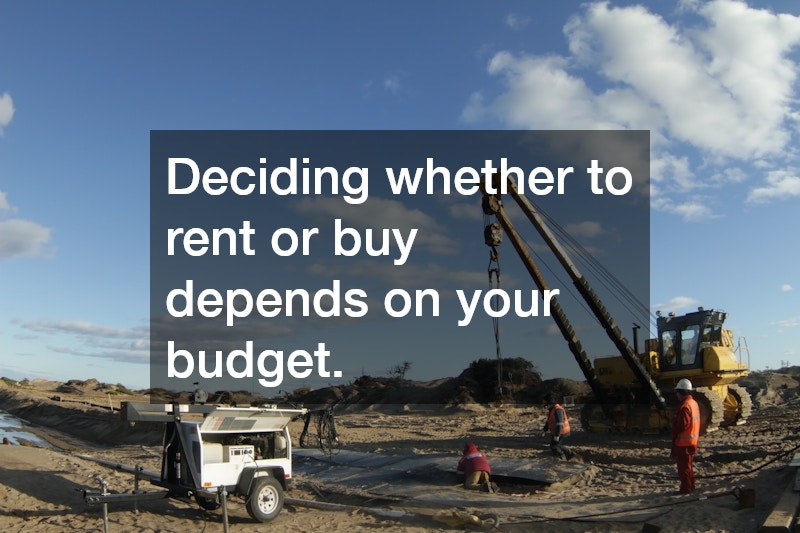Choosing the right excavator is essential to the success of any construction, landscaping or earthmoving project. An excavator that matches your specific requirements will improve efficiency, reduce operating costs and help complete the job safely.
With a wide range of models and features available, making the best choice can be overwhelming. This guide will walk you through key factors to consider when selecting an excavator for your project.
Define the scope and nature of your project
The first step in choosing an excavator is understanding the size and complexity of the work involved. Are you digging small trenches for utilities, clearing a large site, or demolishing existing structures? Different jobs require different machines. Compact or mini excavators are ideal for lighter work or confined spaces. For heavy earthmoving or major construction, full-sized excavators with greater power and reach will be needed.
Understanding your project scope helps narrow down the size and capabilities of the excavator required.
Size and weight considerations
Excavators come in various sizes, ranging from mini units under 2 tonnes to large models exceeding 40 tonnes. The size you need depends on the terrain, ground conditions and access limitations.
Heavier excavators provide more digging power and stability but may cause soil compaction or struggle to access tight areas. Lighter machines are more mobile and cause less ground disturbance, but might lack the force needed for tougher tasks.
Balance these factors carefully to choose a machine that works effectively without causing damage to your site.
Digging depth and reach
The excavator’s digging depth and arm reach are crucial specifications. If you require deep trenches or need to work over obstacles, make sure the model you select can reach those areas comfortably.
Choosing a machine with insufficient reach may result in repeated repositioning, increasing job time and fuel costs.
Bucket type and size
The bucket is your excavator’s primary tool for moving materials. Bucket size determines how much earth or debris can be moved in a single scoop. Larger buckets speed up bulk excavation, while smaller buckets provide greater precision in restricted spaces.
Also, consider the type of material you’ll be working with. Rocky or compacted soils require heavy-duty buckets with reinforced edges, while softer soil or sand can be handled with standard buckets.
Fuel efficiency and operating costs
Fuel consumption is a major ongoing cost. Choosing an excavator with a fuel-efficient engine can lead to significant savings, especially on long projects. Newer models often feature engines designed to meet stringent emissions standards while maximising performance.
It’s also worth investigating maintenance costs. Some brands and models have more accessible parts and service centres, which can reduce downtime and expenses.
Versatility through attachments
Many excavators support a range of attachments, including hydraulic breakers, augers, grapples and thumbs. If your project involves multiple tasks, selecting a machine compatible with these tools adds versatility.
This flexibility can reduce the need to rent additional equipment and improve overall site efficiency.
Site access and transportation
Consider how you will transport the excavator to your worksite. Larger machines may require special trailers or permits to move on public roads. Compact excavators are easier to transport and can access narrow or restricted areas.
Also, consider the ground conditions on your site. Soft or muddy terrain may require tracked excavators for better stability and traction, while wheeled models are faster on firm ground.
Operator experience and safety features
The skill level of your operators is important when selecting an excavator. Some machines are designed with user-friendly controls and advanced safety features such as cameras, alarms and rollover protection systems.
These features not only improve safety but can help less experienced operators work more effectively.
Renting versus buying an excavator
Deciding whether to rent or buy depends on your budget, project length and frequency of use. Hiring an excavator provides flexibility and access to newer models without the upfront investment. It’s ideal for short-term or occasional projects.
Buying is a better option for long-term or ongoing use, but comes with responsibilities for maintenance, storage and insurance.
Seek expert advice
If you’re unsure which excavator is right for your project, consult with equipment suppliers or experienced operators. They can provide insights based on your specific needs and site conditions.
Many suppliers also offer demonstration units or trial periods, giving you hands-on experience before making a final decision.
Choosing the right excavator requires balancing many factors, from project scope to operator skill. Taking the time to research and evaluate options will ensure you select a machine that maximises productivity, safety and cost-efficiency.
Whether you need a compact unit for tight spaces or a powerful excavator for heavy earthmoving, matching the equipment to your job saves time, money and frustration.

